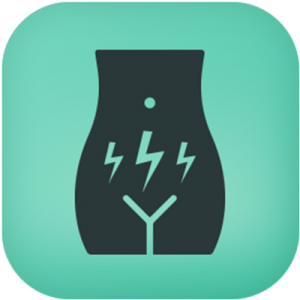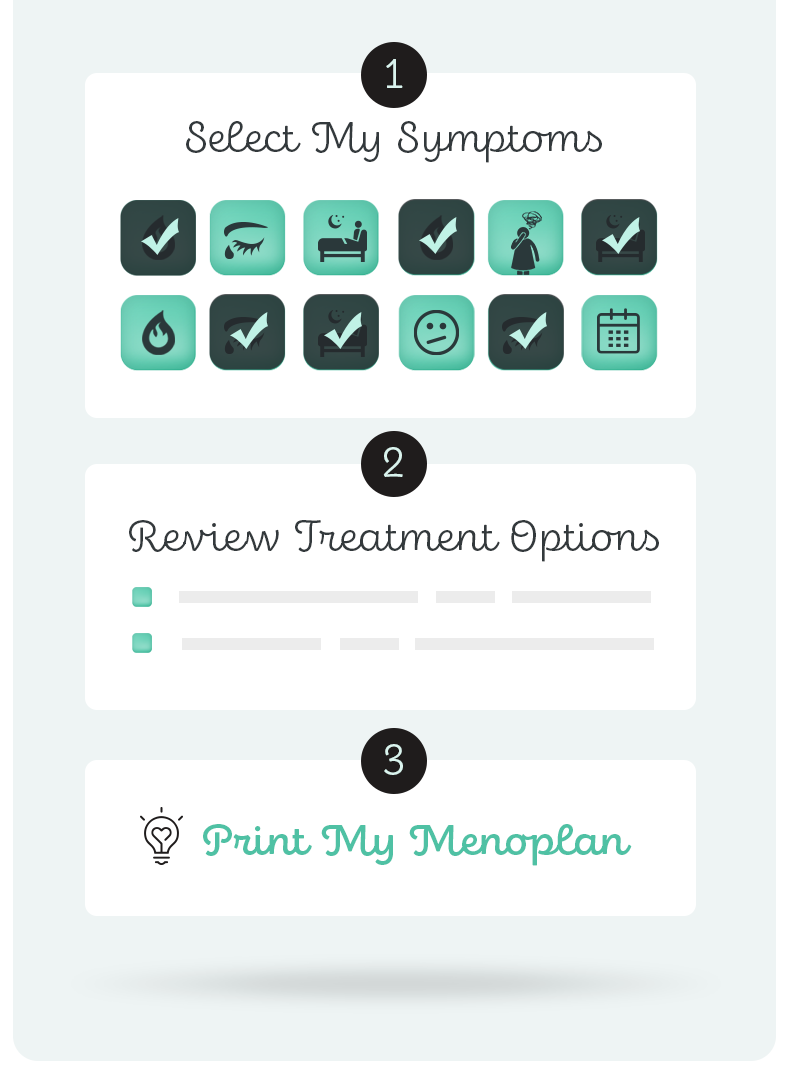Symptoms
VAGINA PAIN, DRYNESS (NOT DURING SEX)
WHAT IS IT?
Some women have vaginal pain during the menopause transition or after menopause. It may be a burning pain, or an itchy feeling. Some women have a vaginal discharge.
If your pain happens only during sexual activity,please visit this page.
Sometimes the pain and discomfort make a woman less interested in sex. When that happens, it is important to decrease the pain before trying other ways to increase the desire for sex.
Read about low sex drive.
WHAT’S HAPPENING IN MY BODY?
The vulva is the area on the outside around the entrance to the vagina. The vagina and vulva change during perimenopause. There is less blood flow to the vagina and vulva, and nerve signals take longer to work. The skin in the vagina and vulva gets thinner and smoother. The vagina may make less natural lubrication.
Your health care provider may see some of the changes during an exam. The changes are called “genitourinary atrophy.” But these observed changes don’t always correlate with how bothered a woman is by symptoms. Worse atrophy does not mean the symptoms will be worse.
WHAT TO EXPECT
It varies a lot from woman to woman. Not all women have these changes. And not all women who show the visual signs of changes to the vagina and vulva have problems with pain or dryness.
It is most likely to happen as women approach their final period and after menopause.
But you shouldn’t suffer in silence. If you are having symptoms that bother you, talk with your health care provider.
Treatments that are inappropriate or have not been studied for this symptom are not listed.
Bruyniks N, Biglia N, Palacios S, Mueck AO. Systematic indirect comparison of ospemifene versus local estrogens for vulvar and vaginal atrophy. Climacteric. 2017 Jun;20(3):195-204. doi: 10.1080/13697137.2017.1284780. Epub 2017 Mar 7. PMID: 28267367.
Edwards D, Panay N. Treating vulvovaginal atrophy/genitourinary syndrome of menopause: how important is vaginal lubricant and moisturizer composition? Climacteric. 2016 Apr;19(2):151-61. doi: 10.3109/13697137.2015.1124259. Epub 2015 Dec 26. PMID: 26707589; PMCID:
Franić D, Fistonić I. Laser Therapy in the Treatment of Female Urinary Incontinence and Genitourinary Syndrome of Menopause: An Update. Biomed Res Int. 2019 Jun 4;2019:1576359. doi: 10.1155/2019/1576359. PMID: 31275962; PMCID: PMC6582847.
González Isaza P, Jaguszewska K, Cardona JL, Lukaszuk M. Long-term effect of thermoablative fractional CO2 laser treatment as a novel approach to urinary incontinence management in women with genitourinary syndrome of menopause. Int Urogynecol J. 2018 Feb;29(2):211-215. doi: 10.1007/s00192-017-3352-1. Epub 2017 May 18. PMID: 28523400; PMCID: PMC5780538.
Kagan R, Kellogg-Spadt S, Parish SJ. Practical Treatment Considerations in the Management of Genitourinary Syndrome of Menopause. Drugs Aging. 2019 Oct;36(10):897-908. doi: 10.1007/s40266-019-00700-w. PMID: 31452067; PMCID: PMC6764929.
Lee Y. Patients’ perception and adherence to vaginal dilator therapy: a systematic review and synthesis employing symbolic interactionism. Patient Prefer Adherence. 2018 Apr 12;12:551-560. doi: 10.2147/PPA.S163273. PMID: 29695897; PMCID: PMC5905492.
Lethaby A, Ayeleke RO, Roberts H. Local oestrogen for vaginal atrophy in postmenopausal women. Cochrane Database Syst Rev. 2016 Aug 31;2016(8):CD001500. doi: 10.1002/14651858.CD001500.pub3. PMID: 27577677; PMCID: PMC7076628.
Rahn DD, Carberry C, Sanses TV, Mamik MM, Ward RM, Meriwether KV, Olivera CK, Abed H, Balk EM, Murphy M; Society of Gynecologic Surgeons Systematic Review Group. Vaginal estrogen for genitourinary syndrome of menopause: a systematic review. Obstet Gynecol. 2014 Dec;124(6):1147-1156. doi: 10.1097/AOG.0000000000000526. PMID: 25415166; PMCID: PMC4855283.
Weinberger JM, Houman J, Caron AT, Anger J. Female Sexual Dysfunction: A Systematic Review of Outcomes Across Various Treatment Modalities. Sex Med Rev. 2019 Apr;7(2):223-250. doi: 10.1016/j.sxmr.2017.12.004. Epub 2018 Feb 3. PMID: 29402732.
Authors: Dr. Caroline Mitchell, Dr. Susan Reed, Dr. Leslie Snyder, Dr. Katherine Newton. Last reviewed: April, 2021.



